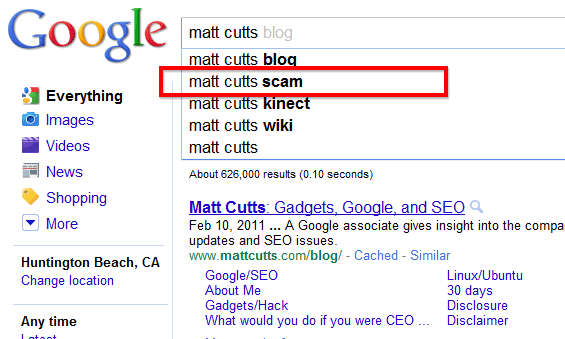Google Autocomplete
This research was conducted in 2010 with the help of multiple SEO practitioners, ourselves included. It’s likely that these factors have changed over time but still contains interesting data to help with future experiments.
Beat the Autocomplete – a Study of Google Auto-Suggest
On September 8th, 2010, the world’s largest Internet search engine, Google.com, released what they referred to as “a new search enhancement that shows results as you type,” appropriately labeled Google Instant. On their website, Google claims that the three benefits of the change include faster searches, smarter predictions and instant results that appear as you type. Few argue the benefits of faster searches and instant results. However, quite a bit of controversy surrounds the smarter predictions, which have raised havoc for many organizations and individuals since the launch of Google Instant.
Google calls the predictions that appear in the search box itself autocomplete, stating that the “algorithm offers searches that might be similar to the one you’re typing”. Up until September 8th, the feature was optional. [Autocomplete] was a default behavior before Google Instant existed. I think you could turn it off – just like you can turn Google Instant off – but the suggestion behavior was out there for about two years (updated 3/11/11 by suggestion from Danny Sullivan). The example provided on the Google Support page says to “start to type [ new york ] — even just [ new y ] — and you’ll be able to pick searches for New York City, New York Times, and New York University”. Unfortunately for many businesses what appears as you start typing in their company name are words such as [ scam ] and [ ripoff ]. Individuals are seeing their personal names appear with words like [ scandal ], [ dui ] and [ lawsuit ], when a name may be the same as another person who the terms are most likely associated with.

There may be a ray of hope. Matt McGee of SearchEngineLand.com, a popular industry portal for search engine marketers, wrote about a lawsuit won by the French legal website Legalis.net over the word arnaqu (French for “scam”) appearing in the predictions. It might be time to put your lawyer on alert if this article doesn’t do the trick.
It’s not in the scope of this study, but many users were also very dissatisfied at the user experience of autocomplete as well. Join the conversation and Google just might listen.
After performing an extensive amount of research in support forums, it’s clear that Google does not intend to change autocomplete predictions, despite the negative impact it may have on businesses and individuals. To better understand the factors that influence Google autocomplete, several experts in the search engine optimization (SEO) field were surveyed with the hope that their insight could help those affected by negative search results push down phrases out of sight from the search bar or remove them altogether.
One expert, unavailable to take the survey, was Brent Payne, who performed his own tests to see if he could manipulate predictions. Brent actually succeeded by employing hundreds of workers on Amazon’s Mechanical Turk to search for one of his listings using a specific (low volume) keyword phrase, thereby influencing the volume of searches. His test was a success; however, the phrases used in the test had very little (if any) volume and very few other listings appear for the query. It was this test that started our list of potential influencers. Though he did not participate in the survey, Brent should be recognized for his indirect contribution at BrentDPayne.com.
Are You a Scam According to Google?
After the launch of Google Instant in December 2010, thousands of businesses began an all out war on their competition within the search results. Thanks to the now permanent Google Autocomplete, ratings, reviews, links and comments all over the Web are being spidered and are influencing what appears as you type your query into Google.
There’s no turning this feature off, so you can’t run from this epidemic, but you sure as heck can do something about it. We surveyed the greatest minds in Search Engine Optimization, including Rand Fishkin, Ian Lurie, Aaron Wall, Tim Critchlow, Tim Eschenauer and Danny Sullivan for feedback on what they believed would influence the search suggestions (also called “search predictions”) to give you ideas on how to combat the garbage your competitors have created for you online.
It could happen to anyone:

All it takes is a little manipulation from your competition, such as a link to Google’s search results from an email with keywords such as Matt Cutts Scam or use of words such as complaints, ripoff, DUI or “goes to prison”. It’s a harsh world out there, but you’re not alone.
Read through the Google Autocomplete Study Results, and let us know what you think of our collective findings. Do take some time to thank the awesome contributors as well!
The Study
Eight participants were asked to rank 13 potential influencers compiled from online research and to provide their own opinion on the algorithm. Ranking was a simple 1-5 scale, with 5 being the most influential factor.

Fortunately, we discovered a few other patterns of suggestion from our experts that weren’t included in the survey but are noteworthy and discussed in detail following the results. These additional influencers included:
- Trending phrases
- Competitive in AdWords bidding
- Location of user performing the search
- Personalized search (searches you may have performed in the past)
